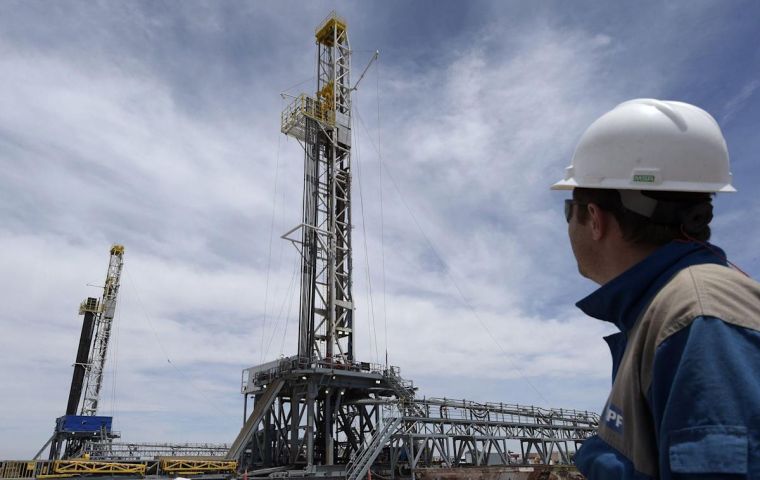MercoPress. South Atlantic News Agency
Cold winter and fuel shortages ahead for Argentina
 Vaca Muerta remains as one of the world's most promising profitable shale deposits, but with no investments and clear rules of the game...
Vaca Muerta remains as one of the world's most promising profitable shale deposits, but with no investments and clear rules of the game... Argentina is on the world's top short list of countries with the largest reserves of gas, but given its political chaos, rabid nationalism and constant changes to the rules of the game, investors remain shy and Argentina will have to prepare for a cold austral winter and even fuel rationing as it's already happening with diesel, desperately needed to harvest summer crops and prepare the soil for summer sowing.
Even Economy minister Martin Guzmán who recently reached a financial understanding with the IMF to avoid Argentina again falling into another default, has admitted that some of the conditions pledged by Argentina to install some rational economics won't be complied...because of the Ukraine situation. But the real fact is that the Vaca Muerta shale gas fields remain mostly in the ground.
A similar shale blessing from nature in Texas and North Dakota has turned the US into a major producer and exporter of oil and gas in a decade, but in Argentina liquefied natural gas is not enough to supply the domestic market and every summer in anticipation of cold winters, the country has to book millions of BTUs to be on the safe side.
Now, however the country competes for liquefied natural gas (LNG) cargoes with industrial giants also looking after gas because of the sanctions on Russia. Prices have skyrocketed, there are shortages and supply chain bottlenecks, and Argentina has the habit of not honoring debts or contracts. Carlos Pagni, a well respected political analyst had anticipated the situation, pointing out that LNG prices would distort any understanding with the IMF, even when it was agreed to anticipate that the UNIT price from last year, US$ 8 could reach US$ 20, this season, but the forecast failed, last week it was at US$ 55. This in money terms, according to Pagni means that while in 2021 Argentina had to invest some US$ 5,5bn in LNG, this season the sum jumps to US$ 11,8bn, something close to an additional US$ 6,5bn.
“Argentina was initially planning to order 60 to 65 LNG shipments, but current prices force adjustments to the original strategy,” Marcos Bulgheroni, CEO of Pan American Energy, one of the country’s largest gas businesses, said during a conference held in Buenos Aires. This means Argentina is “on the verge of having to restrict energy supplies to industrial consumers,” according to reliable government sources.
“It’s going to be a tough winter in terms of fuel supplies because of Argentina’s diminished access to strong currencies like the dollar,” said Agustín Gerez, commander of state-owned energy company Ieasa, which organizes the country’s LNG tenders. “We hope winter will be mild and contain the demand”.
As mentioned above the chronically bad business environment did not attract enough investment to the Vaca Muerta shale deposit, thus delaying development and construction of pipelines needed to pump gas from Patagonia to industrial hubs and urban centers, (and exports to Brazil). As a result, instead of becoming a shale power, Argentina has become a significant importer of LNG. Imports take place mainly in the global spot market, which is quite volatile and now unpredictable. The United States that has promised Europe to replace the lost supply from Russia, and Qatar are the leading world exporters.
Last but not least, negotiations to bring in more gas from neighboring Bolivia have stalled. Argentina competes for Bolivian supplies with Brazil, and as in the rest of the industry pandemic years significantly contracted investment in exploration and exploitation.
Argentina currently imports 7.5 million cubic meters a day from Bolivia. However, it will need approximately double this volume to endure a cold winter between May and September. It’s unclear whether Argentina can secure a deal of this size while Bolivia’s supplies are dwindling, said Álvaro Rios, who was once Bolivia’s oil and gas minister and now runs consultancy Gas Energy Latin America. Bolivian production has fallen by 17% in the last four years as investments in the sector turned shy following the nationalization of gas fields.




Top Comments
Disclaimer & comment rules-

Read all commentsIf the government put as much effort and thought into sorting out their gas industry as they put into celebratingv their disastrous adventure in the Falklands 40 years ago it would serve their people better.. Never mind being cold in the winter and closing down industrial plants look at the all the school uniforms with Malvinas badges on and the proud empty seat at the government table. Why on earth do the Argentine people who by and large are decent, hard working, intelligent people repeatedly elect such totally incompetent people to govern them ??
Mar 30th, 2022 - 03:06 pm +1Commenting for this story is now closed.
If you have a Facebook account, become a fan and comment on our Facebook Page!